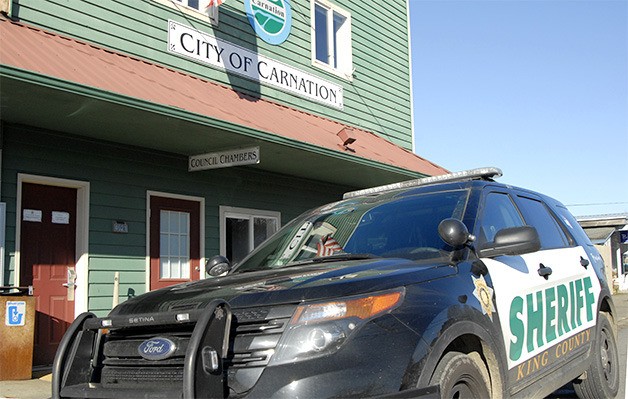Carnation’s new police officer is back. Scott Allen, who got his first job in law enforcement 17 years ago with Carnation’s police department, is once again patrolling the city, this time as both a King County Sheriff’s Deputy and Carnation’s dedicated full-time cop.
“For the last two years or so, I’ve been wanting to get back to patrol,” Allen said, “I’ve been wanting to get back out here to familiar territory, because I know all the people who work out here.”
Allen had spent most of his career after joining King County in the Snoqualmie Valley, either as a detective or shared patrol, but had spent the past seven years as a detective in Seattle. When he heard about the unexpected opening in Carnation—the city learned in October that Duvall was ending its police contract, effective Jan. 1—he jumped for it.
“It gave me a chance to get back into uniform, get back onto the street,” he explained. “I like doing street work.”
Since starting with the city on Jan. 2, he’s made a point of getting onto the streets regularly.
“Things I try to do every day are sit down here at the school zone,” he said, pointing toward Carnation Elementary School from his office above City Hall. “I put my car out there, be visible. And I try to get out on foot once a day and talk to four or five businesses, and then I try and get out on foot at least once a day on one of the trails.”
It’s familiar territory for him, but in January, he said he’d need some time to get a really good handle on what’s happening in the community, and identifying the needs.
“It’s going to take me a good three months, at least, to come up with what the real issues are here,” he said. “I have a good idea of what they are going to be, but there’s not a whole lot going on out here, so it takes some time to figure out what the real issues are and how we’re going to address them.”
Drugs are a big problem here, as they are everywhere in King County. “Drugs are huge everywhere. It’s not just the Snoqualmie Valley, it’s all over. It’s Sammamish, it’s Seattle, it’s Bellevue. It’s rampant,” he said.
Most of the crime seems to be centered on heroin and meth, not just dealing and using, but the incidental crimes that accompany drug users, like burglaries and auto thefts.
He is monitoring three known drug houses and asking fellow deputies on shared patrol to do the same as they pass through town. He’s also been instrumental in making sure they pass through town frequently, by making his office available to other officers, for paperwork, interviews, and other tasks that require an office.
“This will most likely become a hub,” Allen said, particularly now that the North Bend substation has closed. The station closed March 8, when the sheriff’s contract with North Bend ended, and a new five-year contract began with the Snoqualmie Police Department.
Allen and the other deputies will still have to report in to the nearest official substation, in Sammamish, every few days, and “this will just be a place for deputies to come in and interview people up here and take reports once in a while.”
Businesses and residents have already begun to notice the increased number of patrol cars in the area, and are commenting on it. Allen says he’s gotten a very positive response from the citizens he’s met so far, and hopes that will continue.
“I want to accomplish the city’s request to make the people pleased with their local police service, by being visible and approachable, so people have a sense of security,” he said.
Carnation doesn’t have a whole lot of crime, Allen says. Aside from drug-related problems, he said there’s a “smattering” of other issues, and “most of it occurs in unincorporated areas.” Because Allen is a county deputy, he is not stopped by city limits, though, and can go anywhere that needs help.
The same goes for his fellow deputies, he said. “We scratch each other’s backs. They want to help me out, and I want to help them out.”
It’s a mutually beneficial relationship that also helps out the city, he says. “The city’s paying for one cop, 40 hours a week. That’s me. So, the city of Carnation has now become a patrol district, and they’re paying for one cop, but they’re getting everybody.”



